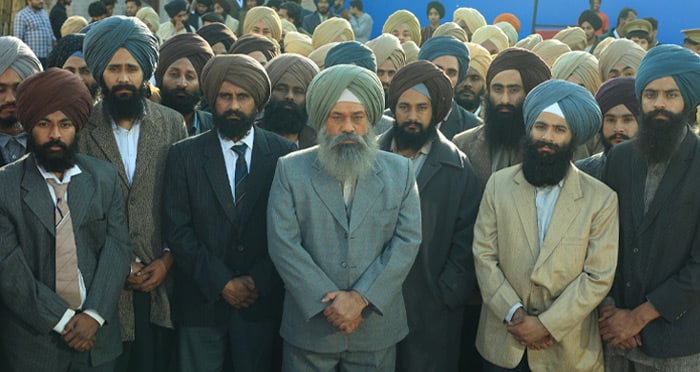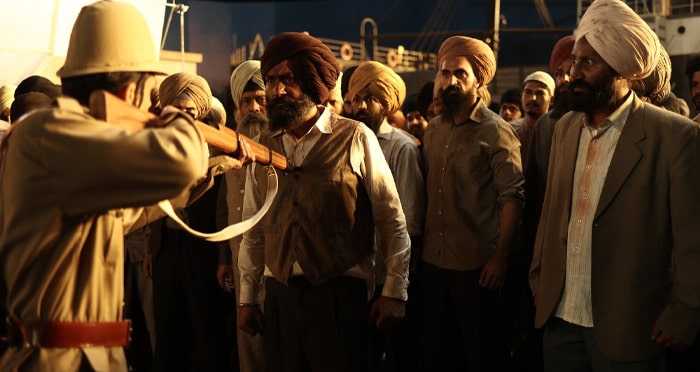By Harpreet Singh | May 2, 2025

Released on May 1, 2025, Guru Nanak Jahaz is a powerful Punjabi historical drama movie-based on the real events of the 1914 Komagata Maru incident. Written by Harnavbir Singh and directed by Sharan Art, the film stars Tarsem Jassar as Mewa Singh Lopoke, Gurpreet Ghuggi as Baba Gurdit Singh, and American actor Edward Sonnenblick as William C. Hopkinson. With compelling performances, emotional depth, and a commitment to cinematic truth, the film brings to light a forgotten chapter in history—honouring the sacrifices of Indian immigrants and reminding us of their courage, unity, and relentless fight against injustice and discrimination. Read on the know more about Guru Nanak Jahaz-full movie review!
Guru Nanak Jahaz tells the powerful story of Indian migrants in 1914 who struggled for their rights and dignity. The film focuses on two key figures-Baba Gurdit Singh, who encourages people to leave Punjab and go abroad for a better future and Bhai Mewa Singh, who later becomes the voice of resistance. At a time when Indians were denied direct entry into Canada, Baba Gurdit Singh arranges a ship from Japan—Komagata Maru. A child onboard says, “Will this ship kill us?” and they name it Guru Nanak Jahaz, hoping for blessings. When the ship reaches Canada, the British deny them entry. The passengers face hunger, insults, and are sent back. When they return to India, many are shot dead by British officers. Bhai Mewa Singh, who supported the passengers, is angry at this injustice. He shoots a British officer, Hopkinson, and later accepts punishment in court. He is sentenced to death. His brave sacrifice is remembered in history as the Komagata Maru incident.
Tarsem Jassar gives one of his best performances as Mewa Singh. He shows both the courage of a freedom fighter and the pain of a man facing injustice. His acting, especially in the courtroom scenes, is very emotional and powerful. Gurpreet Ghuggi surprises viewers with influential role as Baba Gurdit Singh. He moves away from comedy and gives a strong, emotional performance, especially during the ship journey scenes. Edward Sonnenblick plays British officer Hopkinson very well and Mark Bennigton as Malcom Reid, showing his cruel and strict nature.

Director Sharan Art deserves praise for his meticulous handling of such a complex subject. His direction beautifully captures the era of 1914, with detailed sets, period-accurate costumes, and realistic portrayals of both Punjab and Canada. The film’s VFX work is exceptional, thanks to BRAVE ART STUDIOS—something rarely seen in Punjabi cinema—bringing historical moments to life with visual depth and accuracy. The story is well-balanced, with no dull moments throughout. The dialogues, penned by Harnavbir Singh, are impactful and thought-provoking. One powerful line, “Aukata Bhau Gaddiyan Naal Ni Naapiyan Jandiya, Aukata Zameera Naal Hundiya Je”, translates to “True greatness is not measured by wealth or power, but by the integrity of one’s conscience.” This thought-provoking dialogue leaves a lasting impression on the audience, highlighting the film’s message of self-respect and moral strength.
The music in Guru Nanak Jahaj is emotional and powerful, matching the film’s deep story and serious themes. Instead of using typical commercial songs, the film uses a strong background score that adds meaning to important scenes—especially those showing struggle, sacrifice, and quiet emotion. Traditional Punjabi sounds are mixed with orchestral music, making the scenes feel even more real and touching. One of the most emotional songs is “Be-daishi Hoye Firde Aa”, written by Tarsem Jassar and beautifully sung by Ranjit Bawa. It expresses the pain and pride of those leaving their homeland to fight for their rights. Another moving moment comes with Bir Singh’s “Salok Mahalla 9”, a spiritual shabad that brings strength and peace during scenes of hardship and loss. Also, Tarsem Jassar’s song “Hatt Pichhe” adds to the film’s message of courage and silent protest, connecting deeply with Bhai Mewa Singh’s sacrifice and the Ghadar movement.
Guru Nanak Jahaj is not just made for entertainment—it’s a powerful reminder of our history and the struggles of our ancestors, especially for today’s generation and immigrants. It shows how our forefathers fought bravely for their rights. One of the film’s strongest messages is the unshakable principles of Baba Gurdit Singh, who refuses to give a bribe or take a false oath on Guru Granth Sahib Ji. Similarly, Bhai Mewa Singh stands firm in his beliefs but is forced by circumstances to take up arms. This is a must-watch film that inspires pride, reflection, and respect for our roots.